The very short history of the offshore station Capital Radio
by Hans Knot
The offshore radio station Capital Radio was rather short-lived. In 1970 the station aired its programs for not yet three months: from 1 September till 10 November. The most striking mark of the station, probably was the unique antenna, that folded itself around the mast of the ship that housed the station: MV King David. Hans Knot here summerizes the short history of the station and its ship.
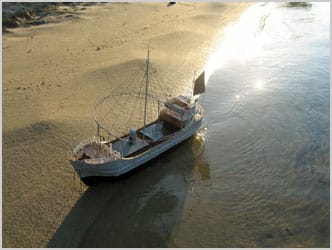
On 11 November, back on the high seas after a maintenance visit to Zaandam harbour, the King David lost her anchor, while the crew tried to lower a spare anchor during a force nine gale. It was all in vain, and the ship beached near Noordwijk. This was the end of Capital Radio.
The station was run by the International Broadcasters Society (IBS) managed by Canadian Tim Thomasson, assisted by his wife Berthe Thomasson-Beydals. Thomasson, who had also a British passport, learnt his trade at Radio Netherlands Worldwide, but left the station after several disagreements. Berthe had a radio background (Radio Netherlands Worldwide, AVRO and Radio Luxembourg) and she recorded some programmes for Capital Radio.
The land studios and office were in the basement of a large flat in Bussum, where programmes were made with a simple tape recorder — and basic connection with the recorder — on the floor! Everything on board was under direction of a Dutch captain who was allowed, in cases of emergency, to broadcast messages over the station’s frequency. Beydals explained why the name ‘Capital’ had been chosen: “This English word can mean everything, such as capital (being a major city), but also a letter, or ‘impressive’ or just a lot of money. We didn’t translate it deliberately; everyone can choose one meaning and I won’t forbid the accent to fall on ‘a lot of money’.
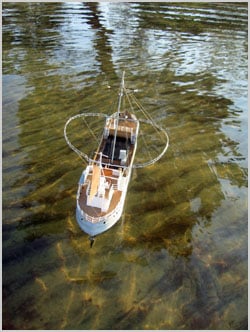
Did Capital Radio have the intention to fly at the Dutch official broadcasters, such as David did with Goliath? “We want to be positive. Behind Capital Radio there’s a non-profit society, a world professional radio and television broadcasting organization. That club, the International Broadcasters Society wants to prove that a commercial radio station isn’t necessarily third-rate. We want to provide super work, liberty on the air. In our country it’s a rotten situation regarding that liberty. Here a commercial station has to have recourse to the free sea. I hope that we won’t fare like the REM, restrained by the police and the navy.”
“Capital Radio will broadcast paid for adverts, not only just for churches and political parties. They’re welcome although we reserve the right not to broadcast messages that don’t come up to the prevailing standards. We’ll have non-stop light music programmes, no beat, pop or rock-hard jazz. We go for soft background music, what people want. We’re testing, and still get mail from doctors, lawyers, but also from other professions . We made a market survey and Capital Radio will surely be successful. It’s too early to provide news bulletins, that’s maybe something for an imaginative newspaper hiring airtime with us. We should tell the listeners that the news was brought by paper XYZ. Must be very interesting, commercially spoken.”
Would Capital Radio become a station with a smile? “We want to broadcast programmes pleasant to listen to, twenty hours a day, from 6 am till night 2 am. Friday, Saturday and Sunday we’ll stay on air 24 hours a day. The market is so large, we’ll address us at the over twenties. They aren’t so much pop music listeners.”
The necessary funds to start the station (purchase of tender and radio ship, equipment, land-based studios) were financed by a number of wealthy members of the IBS, established nine years earlier in Bussum by Thomasson. Worldwide there were 2,000 members, but only two of them resided in the Netherlands: the Verwey brothers of Radio Veronica.
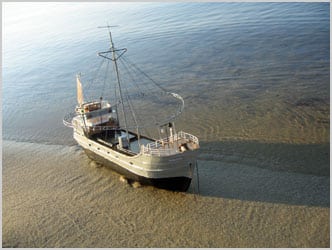
· Saving human lives and protecting human dignity
· Promoting equal chances for men and women in radio management and organization
· Offering an alternative for the options in relation to the European government monopolies
· Proving how cheap and effective radio can be
· Proving how good commercial radio can be
· Demonstrating free radio in practice
· Demonstrating the radio technology progress
· Proving that the radio legislation is completely superseded by the technology.
When will Capital radio start regular broadcasts? “We are waiting for missing equipment. The main purpose is to avoid interference, as warned by the Dutch Post office (PTT). I don’t have a clue about technology, but our antenna is the future. We have barely a loss of transmitter output. The PTT says we have chosen our frequency very well. We ask 1500 guilders an hour; within that hour the customer gets six minutes time: he one minute, we nine minutes and then the customer again, no other adverts in between.”
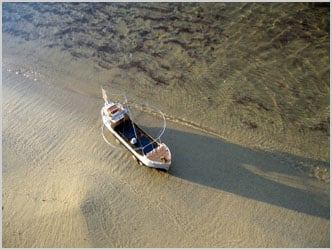
De Telegraaf of 12 September reported that the accident had nothing to do with cutting the anchor chain, but that the crew wanted to sail the ship to another calmer anchorage where repair works on the insulator would be easier.
The station came back on the air on 10 October; as repairs had taken longer and meanwhile necessary arrangements for the forthcoming winter had been made, such as a special device to change the antenna insulators on the high seas. A religious program by Reverend Toornvliet was announced to start on Sunday 11 October; and would be broadcast every Sunday from 11.30 am till noon and Thursday night 9:00 PM till 9:30 PM
Toornvliet’s first sermon “Het feest moet doorgaan!” (The party must go on!) had a fitting title; the evangelist had booked airtime for one year, at a cost of 180,000 guilders. In the early morning of 10 November, however, the King David lost her anchor and drifted towards the coast. After three hours she ran aground at Noordwijk. Gerry Preus, a crew member, remembers that captain Plug woke her up saying that the ship had lost her anchor. She was ordered to wake up the other crew members. They got themselves intoe life jackets and called Scheveningen Radio at 3.30 am.
The Weismuller company was requested to send a tug as soon as possible. On board no attempt was made to keep the King David away of the mainland with the help of the ship’s own engine. At that time there was no helmsman on board. When it became clear that nothing could be saved anymore, five crew members and Batseba, the ship’s dog, boarded the lifeboat Kurt Carlsen. One crew member and the captain remained on board. Florence Oudenbroek, Thin Shan Shanfa, Lisa Christiansen, Gerard Preus and Robert Brown were looked after at the police station.
That same day thousands of people went to the beach, watching the tug MS Hector, assisted by the Kurt Carlsen, trying to tow the King David free at high tide around 1:00 PM. The first attempt to throw a line, being too heavy and too short, failed. At night the tide wasn’t high enough and an inspection the next morning showed that the King David lay higher on the beach. Owner Tim Thomasson, his wife Berthe Beydals and 16-year-old son Chris also stood on the beach. According to them the crew of the King David, the ship itself (owned by the Kangaroo Pioneering Company and hired to the IBS) was armed from top to toe.
“All seamen have been trained in handling the on board tear-gas grenades, automatic rifles and pistols, heavy and light machine guns. This striking arsenal was meant to successfully withstand any possible boarding attempts.” Weapons however were never shown to the press. Later Berthe announced that the authorities were aware of the weapons, and that this caused no problem because fishing trawlers were allowed to have arms on board.
She also told the Algemeen Dagblad that measures had been taken (by throwing components overboard) to avoid breaking Dutch laws. The same day the Dutch PTT and the Prosecution Council issued a statement that no measures would be taken against the stranded ship. The crew had indeed removed the crystal from the transmitter well in time.
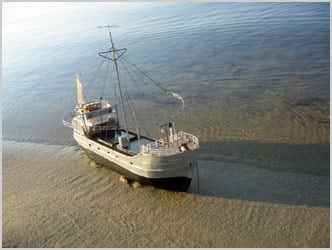
Previously Mister de Groot, managing director of the Liechtenstein based Kangaroo Pioneering Company was asked if the Mebo II would get a replacement radio ship by putting in the King David whereupon he replied briefly and powerfully: “Now you’re asking me too much.” By order of creditors, and particularly the Weismuller Company, bailiff H.G.Kemper of Amsterdam had impounded the King David because claims hadn’t been paid. The owners had refused to provide funds necessary to convene an arbitrage commission that had to assess the towing costs to be paid out eventually.
On 25 May 1971 the Volkskrant reported that on Friday 22 May, the International Broadcasters Society, based in Bussum, was declared bankrupt. This request had been submitted by a female staff member who hadn’t received any wages since November 1970. Berthe Beydals told the newspaper that she too hadn’t been paid for months for her work.
This article was published before in the Freewave Media Magazine and in Offshore Echos.
The author expresses his thanks to Boudewijn Dom for the translation.
The photo’s are showing a recent built replica of the MV King David, made by Paul Ciesielski
Soundscapes — Journal on Media Culture
volume 17, october 2014
